| | | | | | | Presented By Google | | | | Axios AM | | By Mike Allen ·Jan 23, 2021 | | 🧤 Happy Saturday! Today's Smart Brevity™ count: 1,177 words ... 4½ minutes. 🇨🇳 Breaking: "Looking to reset the troubled U.S.-China relationship, Beijing is pressing for a meeting of its top diplomat with senior aides to President Biden to explore a summit between the two nations' leaders," The Wall Street Journal scoops. | | | | | | 1 big thing: Uphill fight to reopen schools |  | | | Illustration: Aïda Amer/Axios | | | | President Biden is making reopening schools a pillar of his pandemic plan, talking yesterday about "a war footing to aggressively speed up our COVID-19 response, especially on vaccines and testing and reopening our schools." - His 200-page COVID plan sets a "goal of getting a majority of K-8 schools safely open in 100 days" — the end of April.
- Biden's proposal for a new COVID relief package includes $130 billion for K-12 schools, which could use the money to improve ventilation, hire nurses and counselors, reduce class size to allow distancing and buy PPE.
But the science around the safety of opening schools during the pandemic remains in flux, Axios Future author Bryan Walsh writes: - Researchers have concluded that young children — while not invulnerable — are about half as likely to be as susceptible to COVID-19 infection as are adults.
- Scientists aren't certain why that is. One reason may be that young children have fewer ACE2 receptors in their respiratory tract, which the virus uses to latch onto cells.
Between the lines: With the right social distancing and protective equipment, in-person schooling for young children — who also happen to be the group that struggles the most with remote education — should still be relatively safe. - But politics, even more than science, appears to be driving the decision to open or close schools.
- Schools in Republican-led states like Texas and Florida have been more likely to remain open, even amid major outbreaks, whereas public schools in Chicago have remained shut since March, and teachers there are threatening a walkout over plans to partially reopen.
Share this story. |     | | | | | | 2. A big reopening test | 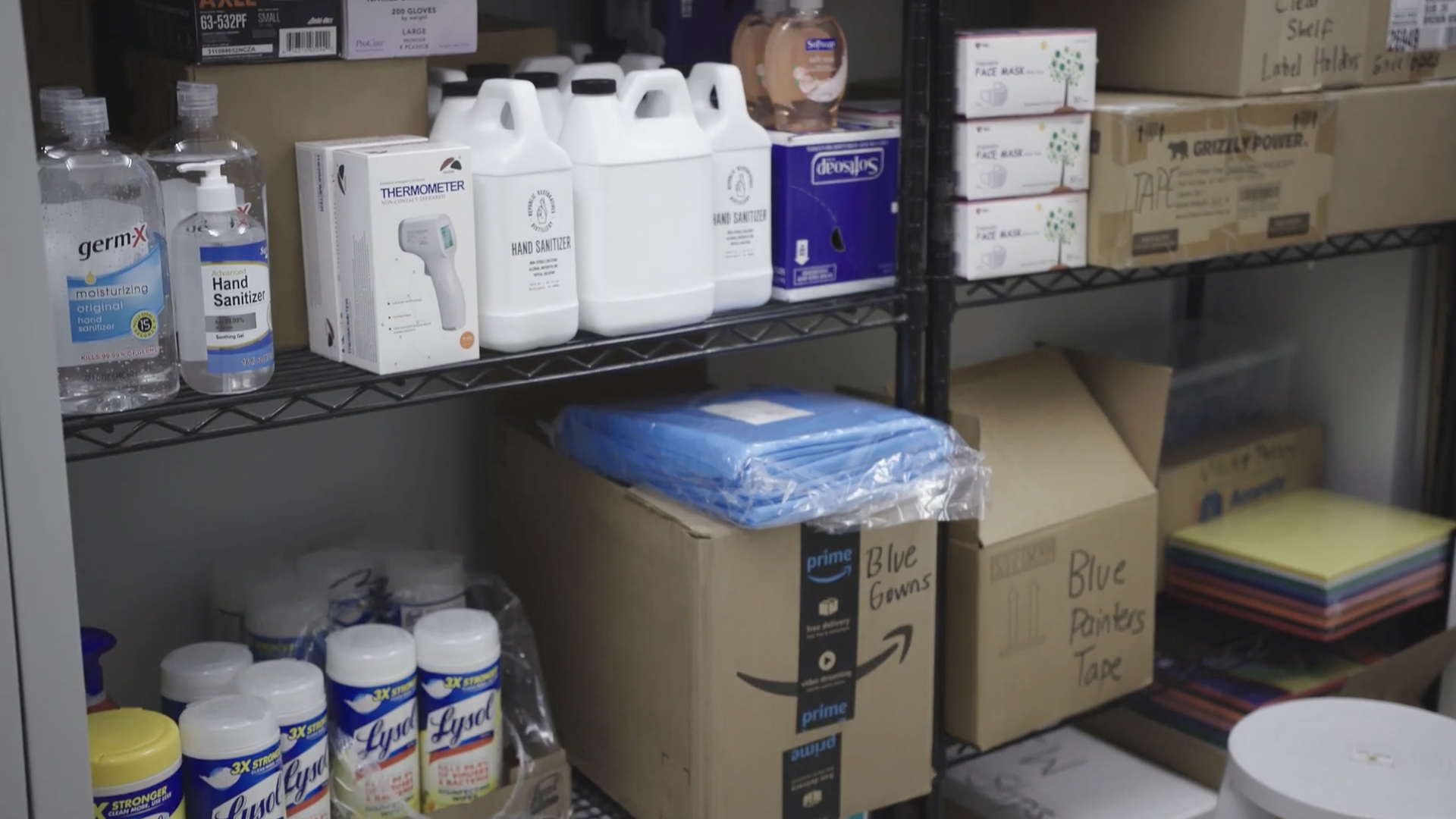 | | | From D.C. Public Schools video | | | | President Biden's new neighbors will provide him with an early test of his goal of widespread elementary-school reopening by the end of his first 100 days: - Although some parents and teachers are skeptical, D.C. schools are tracking toward returning some students to classrooms in early February.
The District "sent notices to nearly half of the school system's roughly 4,000 teachers to return to school buildings Feb. 1,'' along with 70% of the system's 2,800 support staff members, the WashPost reported. - Initial plans call for serving 15,000 (29%) of the school system's 52,000 students across all grade levels.
Mistrust of the reopening plan persists, The Post reports: "[T]eachers have slammed the reopening plan as ill-conceived and unsafe." - A New York Times tracker lists D.C. among eight places — along with six states + U.S. Virgin Islands — where "new cases are higher and staying high."
- In November, D.C. plans to return some high-needs elementary students to classrooms were abandoned when teachers staged a sickout (during remote learning, a sick-in).
The District has a #ReopenStrong website and very interesting video. |     | | | | | | 3. Harris' rise shows evolution of HBCUs | 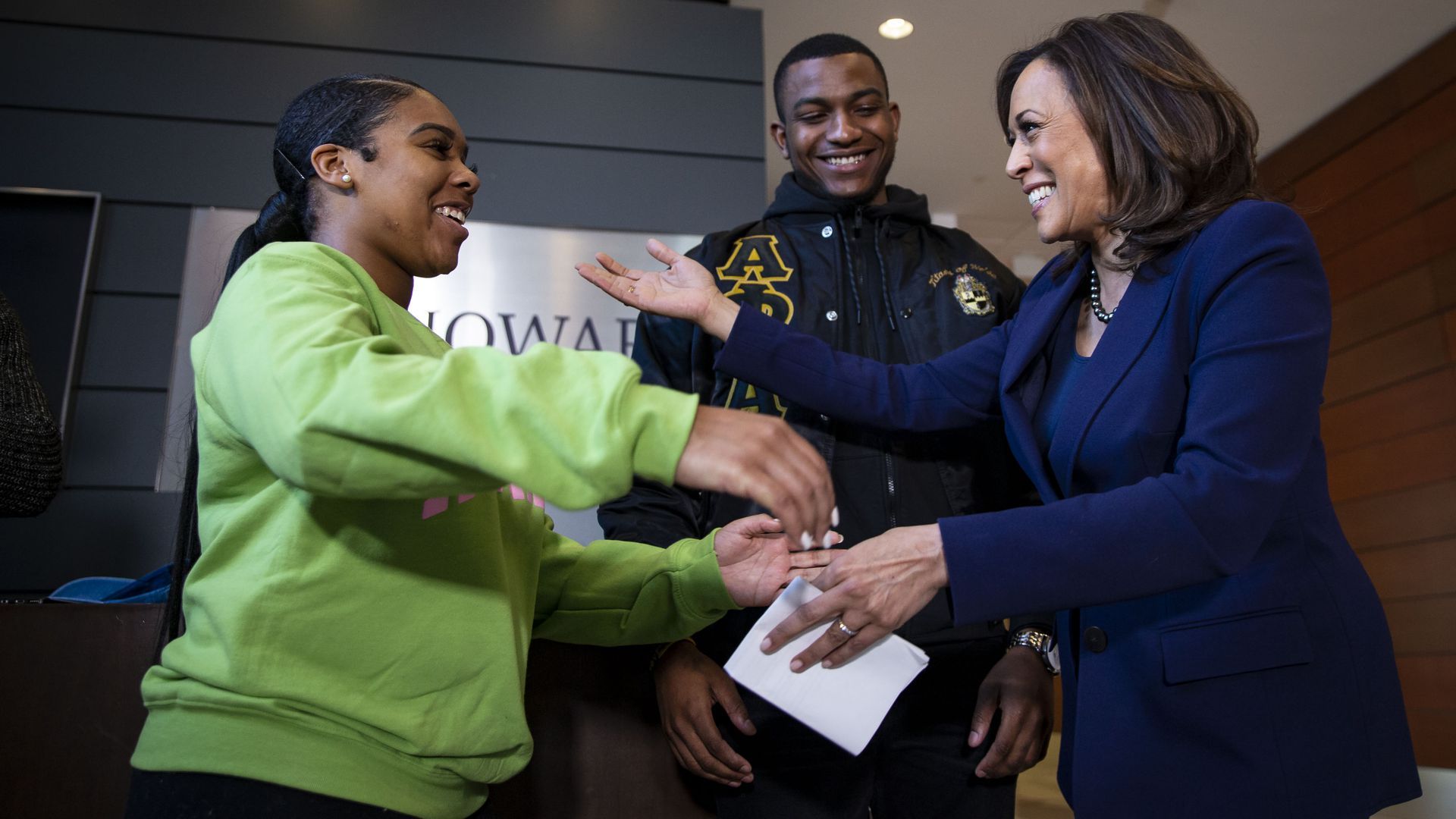 | | | In 2019, now-Vice President Harris greets Mara Peoples and Amos Jackson III of the Howard University Student Association. Photo: Al Drago/Getty Images | | | | Vice President Harris, the daughter of Jamaican and Indian immigrants, is the first graduate of a historically Black college or university to enter the White House — and her background reflects the changing demographics at HBCUs, Axios race and justice reporter Russell Contreras writes. - Why it matters: Harris' accession highlights the often overlooked legacy of HBCUs, which have educated Black students for generations. Today, in a transforming nation, the schools also attract Latino and Asian American students, as well as students from immigrant families.
Non-Black students make up around a fourth of HBCUs' student populations, according to the National Center for Education Statistics. - In 1976, non-Black students were only 15% of the HBCU student population.
Between the lines: HBCU officials say the institutions' survival rests on recruiting students like Harris, who graduated from Howard University in 1986, and attracting a more diverse student body to stave off enrollment declines. |     | | | | | | A message from Google | | Google's Digital Coaches program helps over 58,000 small businesses | | |  | | | | Grow with Google Digital Coaches provide online workshops and hands-on guidance to help local Black and Latino small businesses gain skills to reach new customers and thrive online. The program just expanded, now bringing its presence to 20 markets. Learn more. | | | | | | 4. Pic du jour | | Photo: Mario Tama/Getty Images A drone's-eye view of motorists lining up at a mass COVID-19 vaccination site at Dodger Stadium last night. |     | | | | | | 5. Focus group: Former Trump voters nix 2024 |  | | | Illustration: Sarah Grillo/Axios | | | | "Relief" is the top emotion some swing voters who supported Donald Trump in 2016 say they felt as they watched President Biden's swearing-in. - Followed by "hope," writes Margaret Talev, managing editor for politics.
Why it matters: Our Engagious/Schlesinger focus group shows that for many voters on the bubble between parties, this moment is less excitement for Biden or liberal politics, and more exhaustion with Trump. |     | | | | | | 6. Impeachment II trial begins week of Feb. 8 | | Graphic: CNN |     | | | | | | 7. "Hammerin' Hank" became force for civil rights | | Hank Aaron eyes the flight of his 715th homer, against the Dodgers on April 8, 1974. Photo: Harry Harris/AP Georgia Gov. Jimmy Carter, just two years from being president, was in Atlanta-Fulton County Stadium in 1974 when the Atlanta Braves' Hank "The Hammer" Aaron broke Babe Ruth's record with homer No. 715. - "A breaker of records and racial barriers, his remarkable legacy will continue to inspire countless athletes and admirers for generations to come," Carter said after Aaron died in his sleep at age 86.
- Read more reaction.
Below: On Jan. 5 (just three weeks ago), Hank Aaron received the COVID vaccine at the Morehouse School of Medicine in Atlanta, as part of a message by civil rights leaders to Black Americans that the shots are safe. Photo: Ron Harris/AP |     | | | | | | 8.🎙️ Larry King, 87, titan of talk | | In 1999, Larry King and Linda Tripp on CNN. Photo: Reuters It was 1999, and "for the full hour," Larry King had Linda Tripp (above) — whose tapes of Monica Lewinsky provided evidence of her affair with President Clinton. "So fantastic only LARRY," as his former executive producer Tammy Haddad said when I texted her that. CNN's Victor Blackwell had the perfect words when he interrupted a conversation about President Biden with the breaking news at 8:07 a.m.: "We have lost a legend." - The suspender-wearing King, whose iconic "Larry King Live" aired on CNN for 25 years, died this morning at 87 at Cedars-Sinai Medical Center in L.A.
- King had been hospitalized with COVID.
See CNN's tribute video, narrated by Wolf Blitzer. |     | | | | | | 9. 📺 Brokaw's epic road from South Dakota | 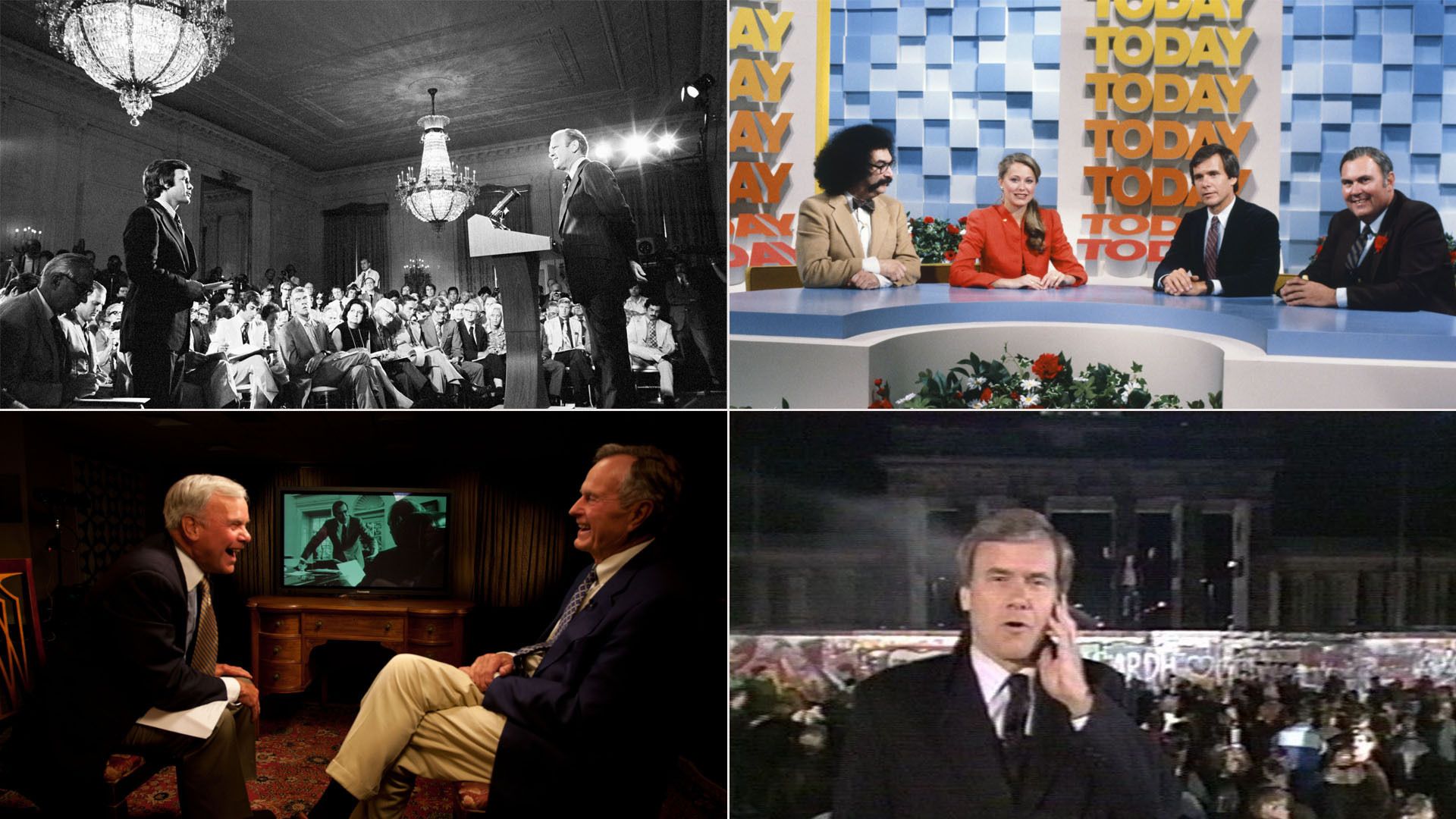 | | | Photos (clockwise): David Hume Kennerly/Getty Images, NBC News (2), David Hume Kennerly/Getty Images | | | | Tom Brokaw — the only NBC anchor to helm "Today," "Nightly News" and "Meet the Press" — is retiring after 55 years at the network. - NBC noted that Brokaw's first book, "The Greatest Generation," was one of the most popular nonfiction books of the 20th century. The term is widely used for those who survived the Great Depression and fought in World War II.
The four photos above (clockwise from upper left) reflect his amazing career: - In 1974, President Gerald Ford takes a question from NBC News White House correspondent Tom Brokaw, age 34, during the president's first presser.
- Brokaw on the "Today" set in 1981 with Gene Shalit, Jane Pauley and Willard Scott.
- Brokaw was the only U.S. network anchor to report from the Berlin Wall the night it came down in 1989.
- Brokaw interviews former President George H.W. Bush in Kennebunkport, Maine, in 2006.
Tom and his wife, Meredith, have always been great encouragers and supporters as we started Politico and now Axios. Thank you, Mr. Brokaw! |     | | | | | | 10. 1 smile to go: My favorite lottery story |  | | | A Mega Millions purchase yesterday in Cranberry Township, Pa. Photo: Keith Srakocic/AP | | | | We learned overnight that someone bought a winning ticket for the $1 billion Mega Millions jackpot, the third-largest lottery prize in U.S. history, at the Kroger in the Detroit suburb of Novi, Mich. That reminded me of my favorite lottery story: In the olden days, before everyone was wired 24/7, there was something called "after deadline": The show was off the air, or the paper was put to bed, and you were done for the day. I was a reporter at the Richmond Times-Dispatch and I can tell you that — except for maybe the forecast of a big snowstorm — there's no bigger story in a local newsroom than when the Powerball gets big. - After deadline, some of us were talking about what we'd do if we won. The late Tom Campbell, the longtime city courts reporter, was typing away on his Atex terminal. We didn't even know he was listening. Tom looked up and said:
If I won the lottery, I'd still work here. But I'd take a lot less [crap.] And he went back to typing. |     | | | | | | A message from Google | | Minority-led small businesses are relying on digital tools | | | 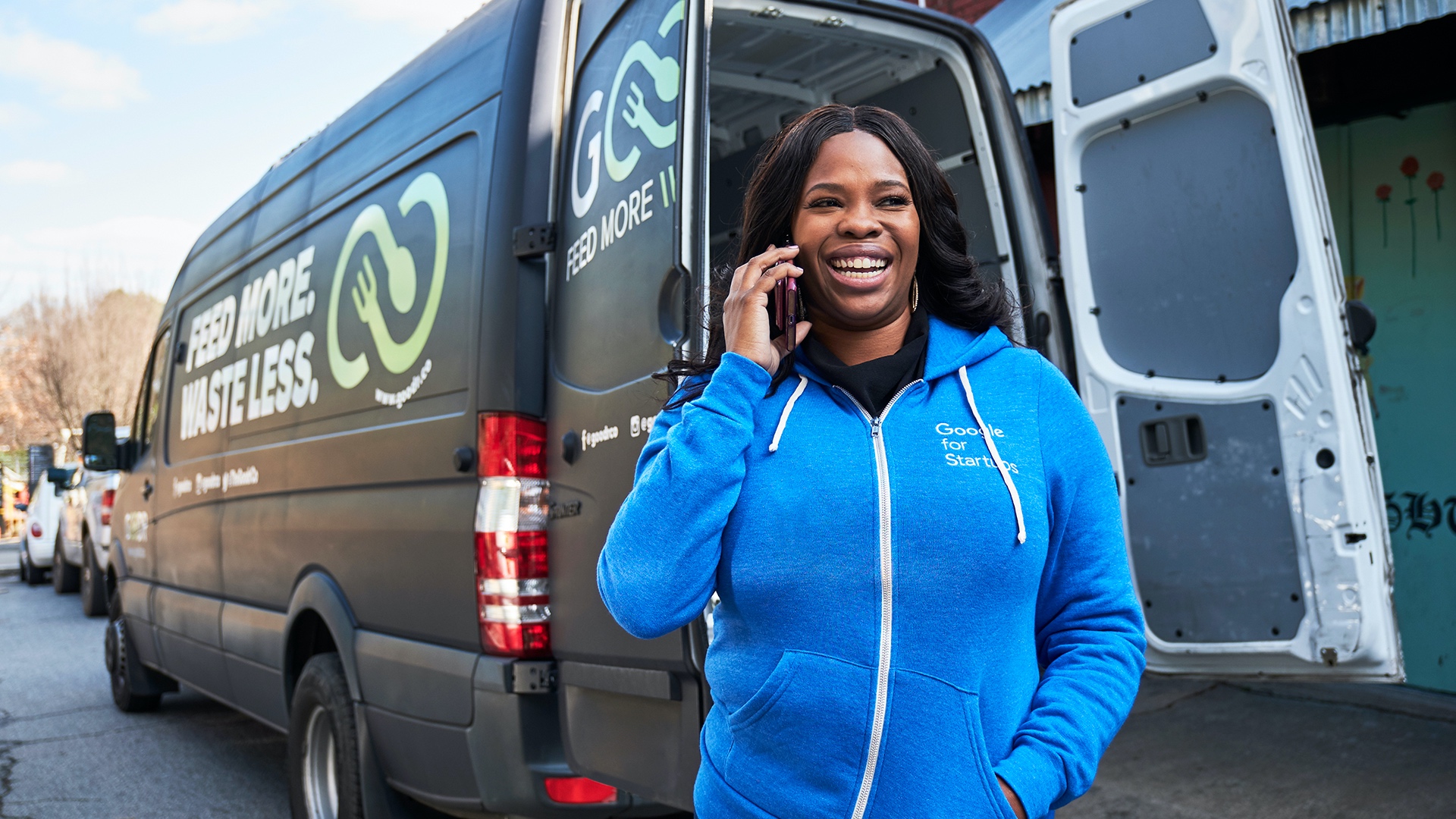 | | | | Small businesses owned by minorities are more likely to make the most out of digital tools during COVID-19, according to a Connected Commerce Council report. Since launch, Google's Digital Coaches have helped over 58,000 diverse small business owners utilize digital tools for free. Read more. | | | | 📬 Thanks for starting a new term with us. Please invite your friends to sign up for Axios AM/PM. | |







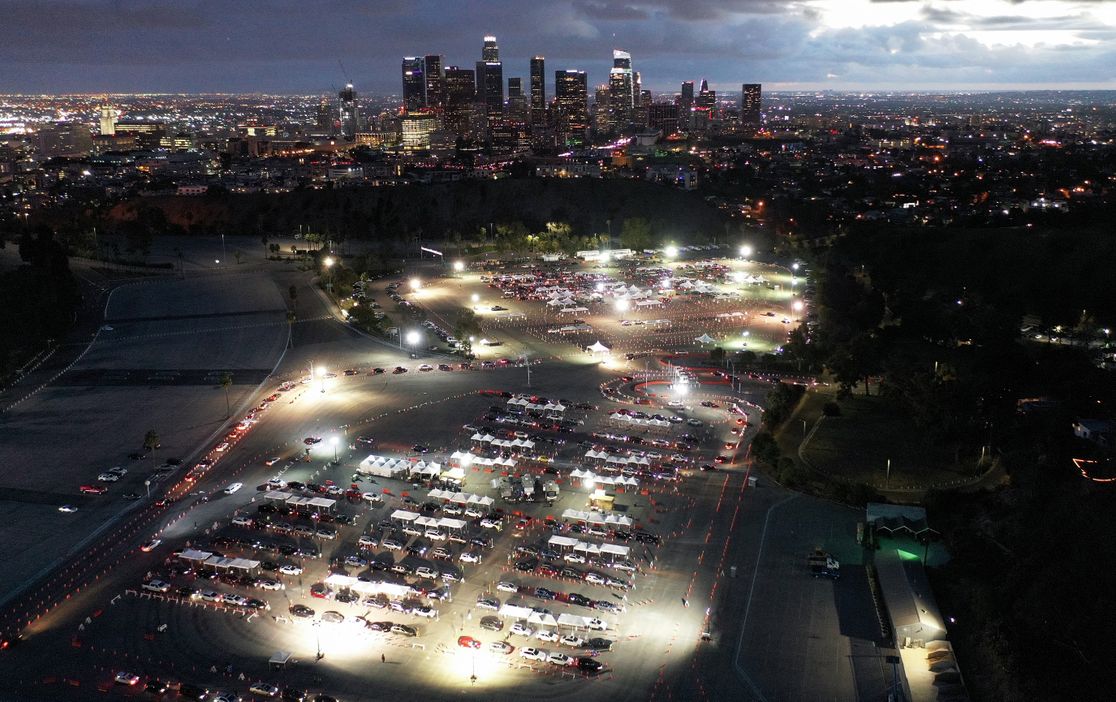




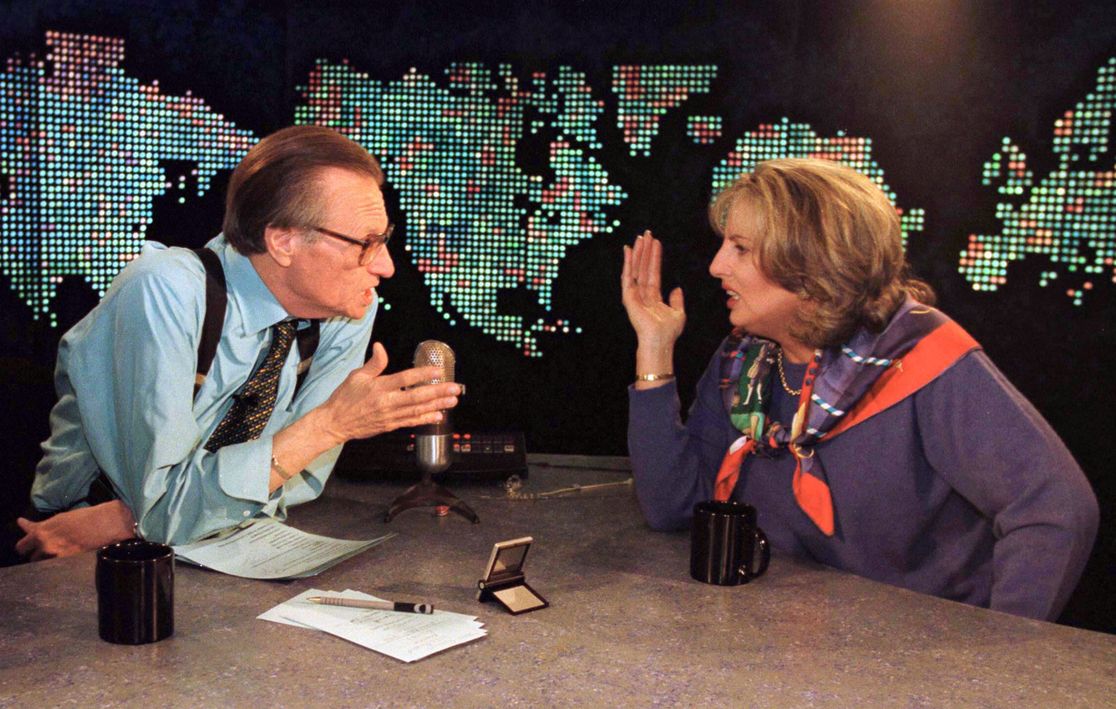


No comments:
Post a Comment